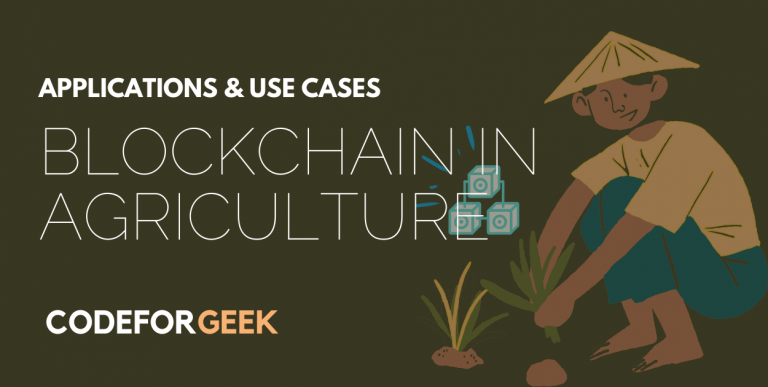Blockchain in agriculture is what we are talking about today! The agriculture industry was valued at $9602.79 billion in 2020 and was then expected to hit more than $10.1 billion market value, at a compound annual growth rate (CAGR) of 6%. Well, that’s quite huge. In fact, many have referred to agriculture as the world’s largest industry.
Even though the industry is vital and extremely vast, it still faces many drawbacks. The industry requires immense supervision, adherence to laws and protocols, and care.
Although there have been soothers that have sprung up to relieve the sector such as mechanic labor, government rebates, allowances, and facilities, the players now have to worry about these. If anything, anywhere goes wrong the entire system may fall apart as everything is closely connected.
The emergence of blockchain technology marked the arrival of the real reliever. The technology, with its powerful abilities uplifted and to a large extent, even revived huge parts of the industry. With blockchain in agriculture now, development and expansion are a mutual thing for both.
The agriculture sector today faces complex problems such as the fast-changing consumer demands which in turn creates a varying demand for materials. Thus, making the experience a dire one.
This article will throw light on the amazing use cases and applications of blockchain in agriculture. We will first understand what blockchain is exactly and then its use cases and applications.
What is Blockchain all About?
A blockchain network is simply a network of blocks that are connected blocks forming a chain. The system chiefly functions as a shared or decentralized ledger system.
Whenever a transaction takes place or data is stored on a blockchain network, the system will immediately record the details of the transaction or other data on the secure ledger that is shared across various nodes or computers spread across the world.
These blocks may also hold other data in them. However, it is important to note that once this information is stored, it lives inside cryptographically secured blocks on the network assigned to them, forever in their original form. In technical terms, once some data is stored in a block, it becomes immutable, that is, it becomes extremely difficult for anyone to change or delete it.
No one, other than the owner of the data and some verified nodes has access to this information only if they have the key to these blocks that allow them to make changes to some extent. However, the changes are only approved when all nodes on the network validate and verify them. This makes the technology ultra-secure.
If in case a hacker tries to alter the data in these blocks, these nodes can immediately reject or disagree and the process will be automatically aborted.
To validate new blocks on the chain, nodes use hard drive space. Many blockchain networks even incentivize nodes that allocate higher amounts of space for the same. This is also one good way for people to earn crypto.
Blockchains are popularly known to be decentralized that means they expel all central authorities out of the system such as banks and governments.
The architecture of a blockchain network is such that every previous block in the network is linked to the next block. This interconnection of blocks and data is a great way to keep prowlers at bay.
Know more about blockchain technology. Click here to read this blog.
Let us now go further and take a look at the amazing use cases of blockchain in agriculture.
Blockchain in Agriculture: Amazing Use Cases & Applications
Now that we have a better idea of what blockchains are, let us waste not much time and take a look at the breathtaking use cases of blockchain in agriculture.
1. Finer Management of Inventories
Agriculture is known to be a primitive industry. It is far away from the reach of advanced technologies even today in most parts of the world. This has eventually resulted in failing management of inventories thereby resulting in gargantuan amounts of wastages.
With blockchain in agriculture, inventory management is better handled and in a secure way. It can even notify farmers when their produce might expire, making agriculture smarter.
2. Encouragement of Fair Pricing
Farmers across the world face this very common issue of not receiving the deserved price or a fair price for their produces. With the rise of blockchain in agriculture, this problem is in check. Blockchain-based marketplaces have now come up and are helping these farmers to earn fair prices for their products and even reach more buyers than ever before.
3. Provision of Microloans to Farmers
Farmers, especially small and mid-sized, require microloans frequently to keep the business running. However, loans from traditional lenders come with hellish rates of interest which are unquestionably difficult for them to return. Public blockchains now allow these farmers to take microloans from lenders across the world which is also easily payable for them.
Conclusion
Ever wondered how blockchain can be useful in agriculture? The agriculture sector today faces complex problems such as the fast-changing consumer demands which in turn creates a varying demand for materials. Thus, making the experience a dire one.
This article will throw light on the use cases and applications of blockchain in agriculture.





